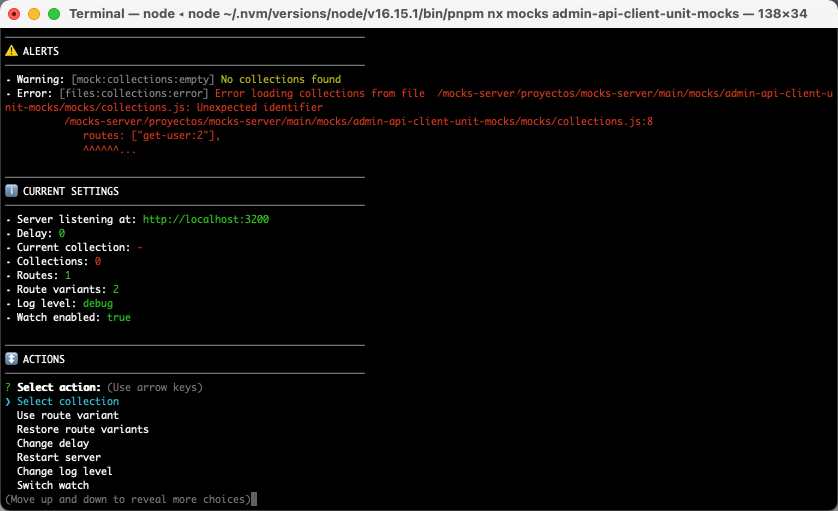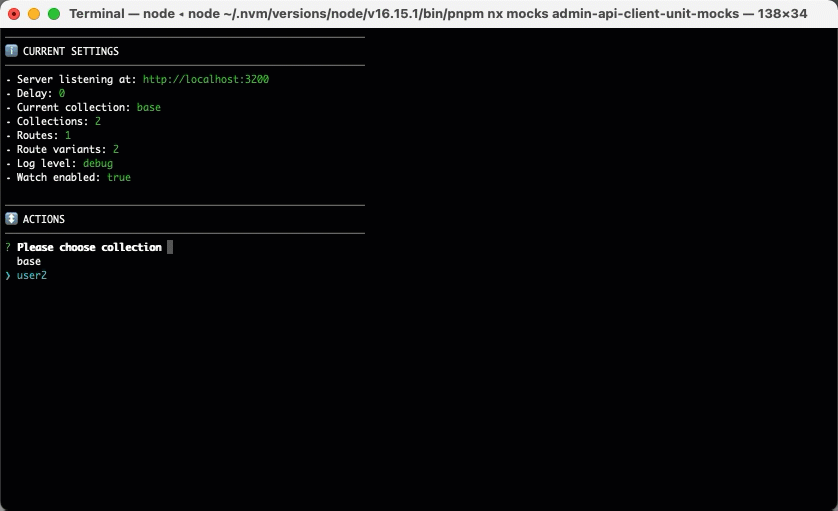Organizing files
Scaffold
When the server is started for the first time, it will create a configuration file and a scaffold folder containing some examples of routes and collections.
project-root/
├── mocks/
│ ├── routes/ <- DEFINE YOUR ROUTES HERE
│ │ ├── common.js
│ │ └── users.js
│ └── collections.json <- DEFINE YOUR COLLECTIONS HERE
└── mocks.config.js <- DEFINE YOUR CONFIGURATION HERE
- The server loads all files in the
mocks/routesfolder, which must contain the route definitions. - The
mocks/collections.*file is used to define collections of route variants. - The server watches for changes in all files in the
mocksfolder, so changing a file will immediately update the mocked API.
Collections and routes can also be defined programmatically. Read the Javascript integration chapter for further info.
Defining routes
The server searches for all files in the mocks/routes folder, including subfolders, and load their content as routes. So, every file in that folder must export an array of routes, or a function returning an array of routes.
In the folder, you can organize the files in the way you want. As a suggestion, you could create a different file for each API entity, and a different folder for each API domain. This would help to maintain your routes organized. For example:
routes/
├── customers/
│ ├── addresses.js
│ └── users.js
└── sales/
├── orders.js
└── products.js
Remember that every file inside the /routes folder must export an array containing Mocks Server routes, or a function returning an array of routes. Read Supported file contents for further info.
Defining collections
The server reads the mocks/collections.* file and loads its content as collections. The file extension can be .js, .cjs, .json, .yaml or .yml (and even .ts, read the using Babel guide for further info).
The mocks/collections.* file must export an array of Mocks Server collections, or a function returning an array of collections. Read Supported file contents for further info.
Supported file formats
All route files and collections file by default can be defined in JSON, YAML or JavaScript, using any of the next extensions:
.jsor.cjs.json.yamlor.yml
.ts files are also supported when Babel is enabled and configured properly
- JavaScript
- JSON
- YAML
- TypeScript
- Mixed
└─ mocks/
├── routes/ <- DEFINE YOUR ROUTES HERE
│ ├── common.js
│ └── users.js
└── collections.json <- DEFINE YOUR COLLECTIONS HERE
└─ mocks/
├── routes/ <- DEFINE YOUR ROUTES HERE
│ ├── common.json
│ └── users.json
└── collections.json <- DEFINE YOUR COLLECTIONS HERE
└─ mocks/
├── routes/ <- DEFINE YOUR ROUTES HERE
│ ├── common.yml
│ └── users.yml
└── collections.yml <- DEFINE YOUR COLLECTIONS HERE
└─ mocks/
├── routes/ <- DEFINE YOUR ROUTES HERE
│ ├── common.ts
│ └── users.ts
└── collections.ts <- DEFINE YOUR COLLECTIONS HERE
You don't have to limit to a file format. Depending on the file content, you may prefer one type or another, so combining them is also possible:
└─ mocks/
├── routes/ <- DEFINE YOUR ROUTES HERE
│ ├── common.js
│ └── users.json
└── collections.yml <- DEFINE YOUR COLLECTIONS HERE
Supported file contents
Both routes and collections files at the end must export an array of valid routes or collections. But they can also export a function returning a valid array, or a promise resolved with a valid array. So, async stuff can be used for defining routes or collections in files:
- Json
- Yaml
- JavaScript
- Async JS
- TypeScript
[
{
"id": "base", // collection id
"routes": ["get-users:all", "get-user:id-1"] // collection routes
},
{
"id": "user-2", // collection id
"from": "base", // extends "base" collection
"routes": ["get-user:id-2"] // "get-user" route uses "id-2" variant instead of "id-1"
}
]
- id: "base" # collection id
routes: # collection routes
- "get-users:all"
- "get-user:id-1"
- id: "user-2" # collection id
from: "base" # extends "base" collection
routes:
- "get-user:id-2" # "get-user" route uses "id-2" variant instead of "id-1"
module.exports = [
{
id: "base", // collection id
routes: ["get-users:all", "get-user:id-1"] // collection routes
},
{
id: "user-2", // collection id
from: "base", // extends "base" collection
routes: ["get-user:id-2"] // "get-user" route uses "id-2" variant instead of "id-1"
}
];
const { getBaseRoutes } = require("./helpers");
module.exports = async function() {
const baseRoutes = await getBaseRoutes();
return [
{
id: "base", // collection id
routes: baseRoutes // collection routes
},
{
id: "user-2", // collection id
from: "base", // extends "base" collection
routes: ["get-user:id-2"] // "get-user" route uses "id-2" variant instead of "id-1"
}
];
}
const collections = [
{
id: "base", // collection id
routes: baseRoutes // collection routes
},
{
id: "user-2", // collection id
from: "base", // extends "base" collection
routes: ["get-user:id-2"] // "get-user" route uses "id-2" variant instead of "id-1"
}
];
export default collections;
Other files and folders
You can create other files and folders in the mocks folder, Mocks Server will simply ignore them. So, for example, if you want to maintain the data you use in your routes separated from the definition of the routes theirself, you could create a fixtures folder, and import it from the route files.
project-root/
├── mocks/
│ ├── fixtures/
│ │ └── users.js
│ ├── routes/
│ │ └── users.js
│ └── collections.json
└── mocks.config.js
- fixtures/users.js
- routes/users.js
module.exports = [
{
id: 1,
name: "John Doe"
},
{
id: 2,
name: "Jane Doe"
}
];
const users = require("../fixtures/users");
module.exports = [
{
id: "get-users",
url: "/api/users"
method: "GET",
variants: [
{
id: "all",
type: "json",
options: {
status: 200,
body: users
}
},
{
id: "one",
type: "json",
options: {
status: 200,
body: [users[0]]
}
}
]
},
];
By keeping your fixtures in a separated folder, but also inside the /mocks folder, you'll take advantage of the files watcher. So, any change in the fixture files will be automatically refreshed in the API mock.
Hot reloading
Every time a file in the mocks folder is changed (including custom files and folders outside the routes folder), Mocks Server will reload everything automatically.
If any file contains an error, the server will add an alert, and you will be able to see the error in the interactive CLI or using any of the other integration tools.

The alert will be removed automatically when the file containing the error is fixed and saved again

Good practices
Use descriptive ids
We strongly recommend to assign very descriptive ids to the routes, variants and collections, because they will be used afterwards in the CLI, the REST API, and all other available integration tools.
A good pattern for assigning an id to a route can be [method]-[entity], as in get-users, get-user, etc.
For assigning an id to the collections, we recommend to maintain a base collection named as standard, base, or default. The rest of collections should extend from it (at least indirectly), and their ids should be a short description of the collection behavior, for example:
[
{
"id": "base",
"routes": ["get-users:all", "get-user:success", "create-user:success"]
},
{
"id": "users-errors",
"from": "base",
"routes": ["create-user:error", "get-users:error"]
},
{
"id": "users-with-long-name",
"from": "base",
"routes": ["get-users:long-names", "get-user:long-name"]
}
]